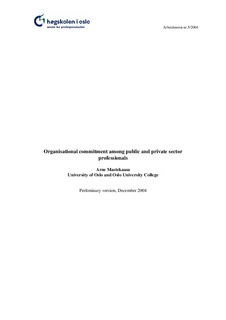| dc.description.abstract | Public sector workers are partly portrayed as highly motivated and with relatively altruistic values, and partly as lazy and opportunistic. This paper compares the level of organisational commitment in professional groups mainly employed in the private sector on the one hand (e.g., journalists, business administration graduates) with public sector professions (e.g., social workers and teachers) on the other. Data come from a sample of people who graduated from Norwegian university colleges in 2001 and who responded to a survey in 2003. It turns out to be considerable variation among the public sector professions, with the highest commitment among teachers and the lowest among nurses, but no systematic difference between the sectors. I also examine to what extent differences among groups can be explained as a function of the rewards people feel they receive in their jobs and of the importance (value) they attach to the various rewards. Special attention is given to the hypothesis of an interaction effect between values and rewards, implying that the more important an individual considers a given reward to be, the stronger the impact of that reward on organisational commitment. The analyses indicate that some of the group differences in commitment are due to corresponding differences in job rewards, but this holds only to a very limited extent. The hypothesis of values-rewards interactions is rejected. It is noteworthy that although the effects of some job rewards differ among the groups, these variations are not captured by the value measures. This may indicate that the processes involved in the formation of commitment attitudes are more complex and less rational than assumed in much of the literature. | en |
